Should You Include Your Target Keyword in The First Paragraph?
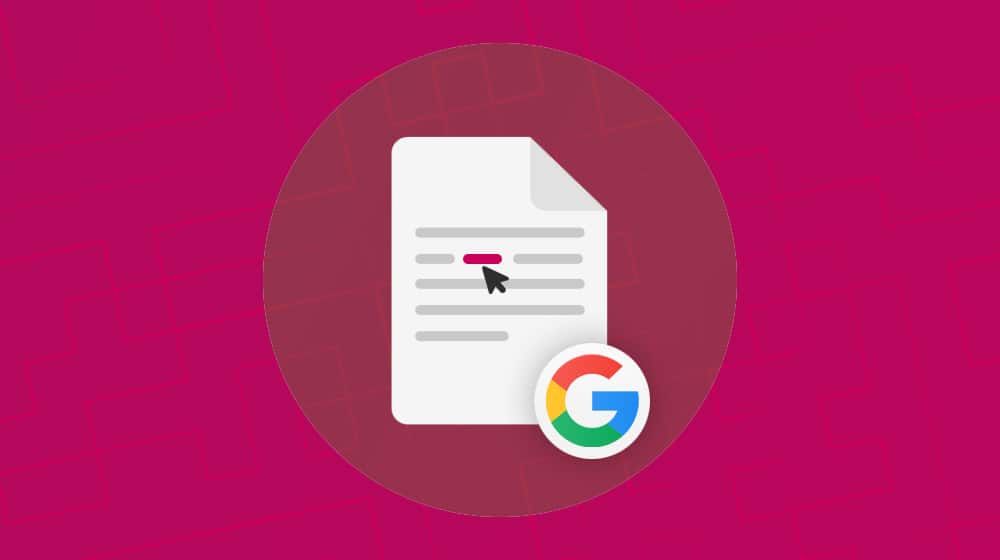
It's undeniable that keywords are an essential part of SEO and content marketing. I've always held a somewhat contentious position that the specific keyword density and even the precise usage of keywords aren't as important as many people like to make them sound. Systematic keyword insertion can sometimes lower your content quality and even put you in the crossfires of Google's new Helpful Content Update.
Several search engine optimization plugins (such as Yoast and Rank Math) also suggest that you include your target keyword at the very top of your article, and they factor it into your SEO grade.
Let me explain the reasoning behind this primary keyword suggestion and if it's an SEO strategy worth following.
How Google Uses Keywords
To know what I'm talking about, you have to understand something about how Google uses keyword phrases. Google is a vastly complex set of interlocking algorithms, everything from the original old-school PageRank-style link analysis to the TF*IDF word counting algorithm to modern latent semantic indexing and machine learning.
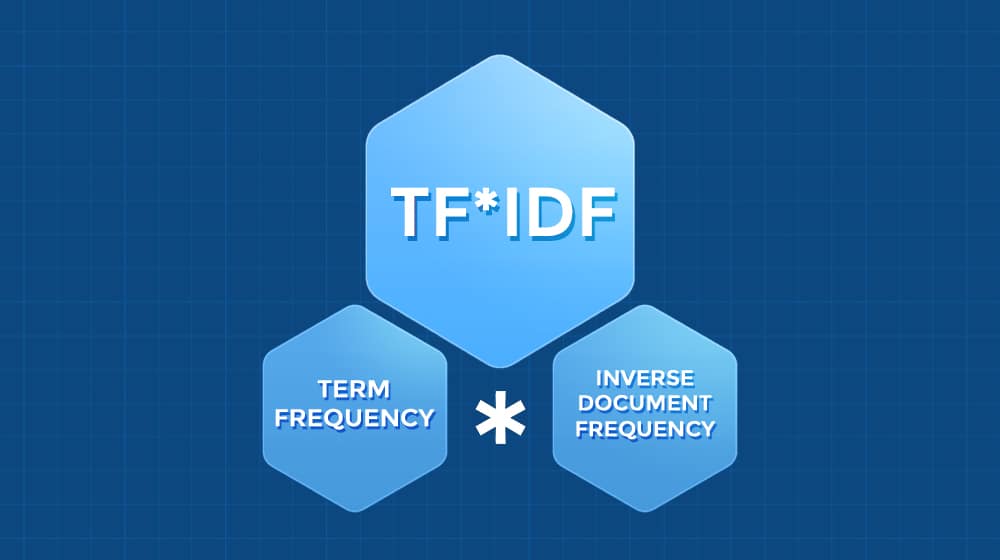
All of this is leveraged to analyze and position every single page for every query on a dynamic and ongoing basis. It's all spot-checked by various teams, like the WebSpam team or the Search Engine Evaluators Google hires through freelance contracting hubs.
There are hundreds of factors about any given page that go into determining the ranking that page will have. These can include things like links, mobile compatibility, the use of SSL, and so on. The ever-popular Backlinko guide to search ranking factors is a pretty good rundown of what goes into Google based on what we know.
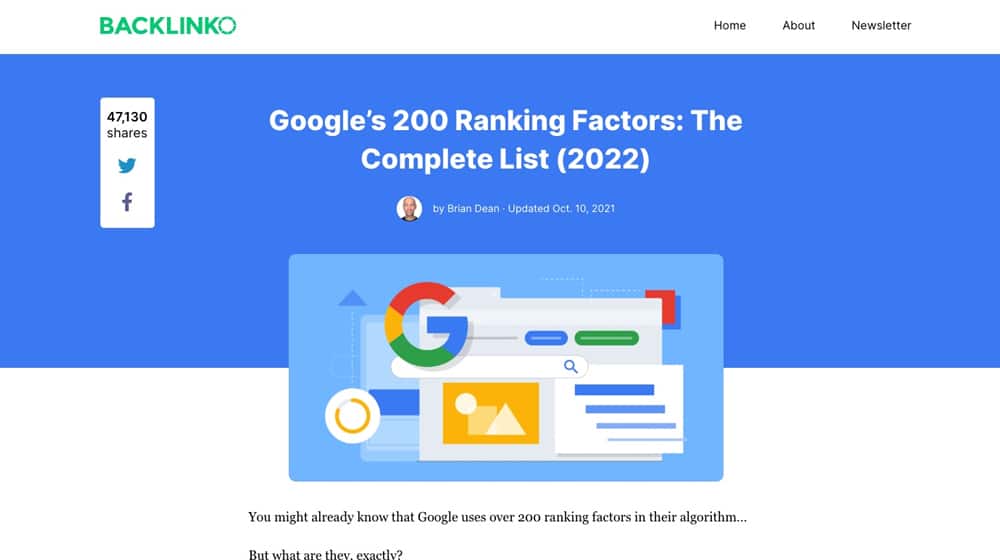
Google is essentially a collection of algorithms that are primarily based on math. STEM-focused marketing folks like to view this as exploitable. They think, "well if an algorithm ranks this, it means there's a "right answer" for the algorithm. If I can hit that, I'll rank better."
In a way, this is true, but it's also really not. If you read my analysis of the TF*IDF algorithm (linked above), you know that Google may have started that way, but they constantly add complexity and nuance to their algorithms. It's never simple.
Keywords fall into this category. Keywords are essential, yes. Keywords guide what you write about and tell Google what the content is about. Every written page on the internet has keywords because it's impossible to write intelligible content without them. When you get down to it, keywords are just nouns, verb strings, and phrases people use.
Does Google care about keywords? Yes, of course, they do. Do they analyze data about the keywords in a piece of content? Yes. Can you optimize a piece of content by using keywords correctly?
Well, that's the million-dollar question!
Keyword Optimization, AI, Helpful Content, and You
One thing to know about Google (the thing that drives a large part of my philosophy on keywords and the thing that Google will tell you up-front) is that you're meant to ignore them. They want to be a facilitator, a middleman connecting people with information. Nothing more.
Many of Google's algorithmic updates over the years have been focused on enforcing this to the best of their ability. If you look at that list of search ranking factors, you'll notice that a lot of them are things that make the internet in general or a webpage in specific a better experience to browse and learn from.
The latest algorithm update, the Helpful Content update, is a prime example. This vast update affects many websites, search queries, and keywords, and all Google will tell you about it is that it's just more of the same. They want you to focus on providing a good user experience and high readability, and everything that gets in the way of that will penalize you.
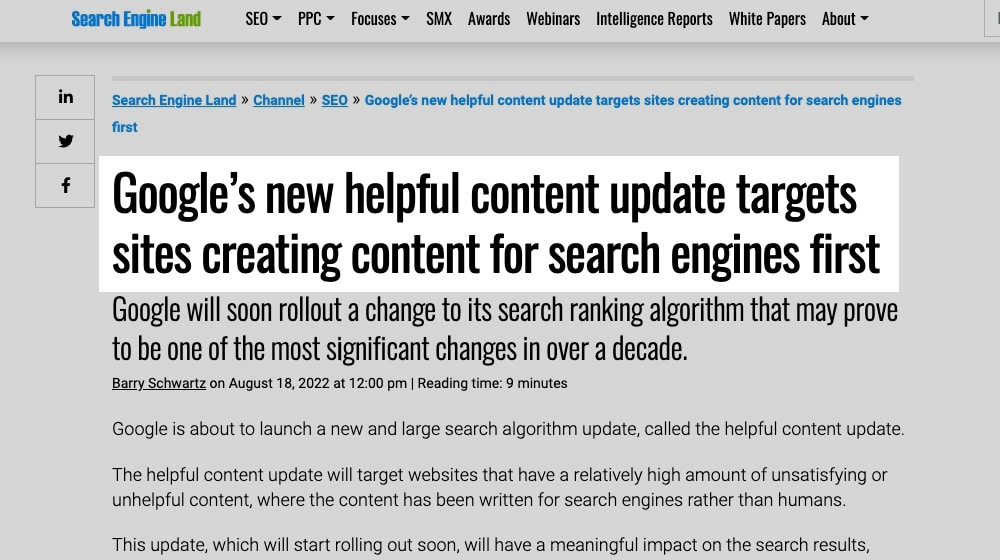
A considerable amount of Google's efforts over the last few years has been aimed at creating ways to filter our unhelpful sites from helpful sites and figuring out where they can draw that line.
Sometimes it's obvious. A site with thin, stolen, garbage, or missing content? Pretty unlikely to be worth anything. A website with fifty ads on it, with pages that have ten words each? Probably not very good. There's a reason you only end up on pages like this if you click a clickbait ad, not through Google SERPs (search engine result pages).
Other times, the line can be difficult. Here's an example.
Let's say you're looking for information on the upcoming iPhone 17. You know it's not out yet, but you want to know when it will be released. So, you run a Google search for "iPhone 17 release date". You end up on a page from a mostly-reputable iPhone news site, and you start reading. When you're done, you're left disappointed; all you learned is that there's no information available yet, so you haven't gained anything from that content or left with any new information.
Another big problem Google is running into is AI content. There are many sophisticated content-creation AIs, but they all have one problem: as a piece of software, they can't think. They can't innovate or identify real solutions or logical results. They can write words that sound compelling, but either those words are mostly stolen from somewhere else, or the things they say are nonsense. Most importantly, they cannot consider context, so content doesn't have a logical flow and frequently goes off the rails, hurting the user experience.
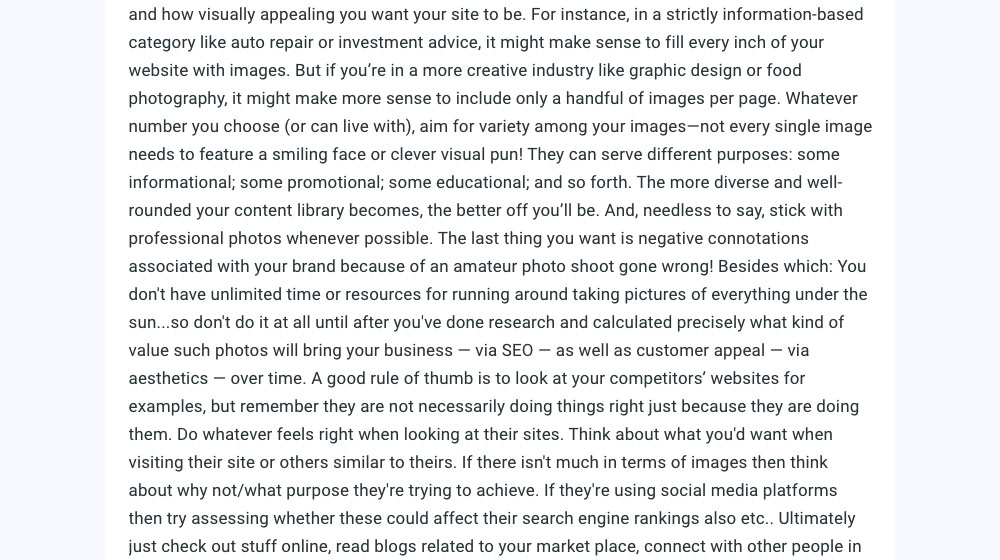
The appearance of good content was, in the past, enough for AI content to potentially rank. It generally took a lot of finesse, but it was possible. Today, though, the Helpful Content update nukes a lot of them. This AI-generated page content isn't that helpful or valuable since the only real value it can provide comes from a source it used to generate.
AI can do more than generate content from whole cloth, though. For example, SEO tools like MarketMuse and Clearscope can analyze content and provide suggestions for making it just a little better in the eyes of Google's algorithms.
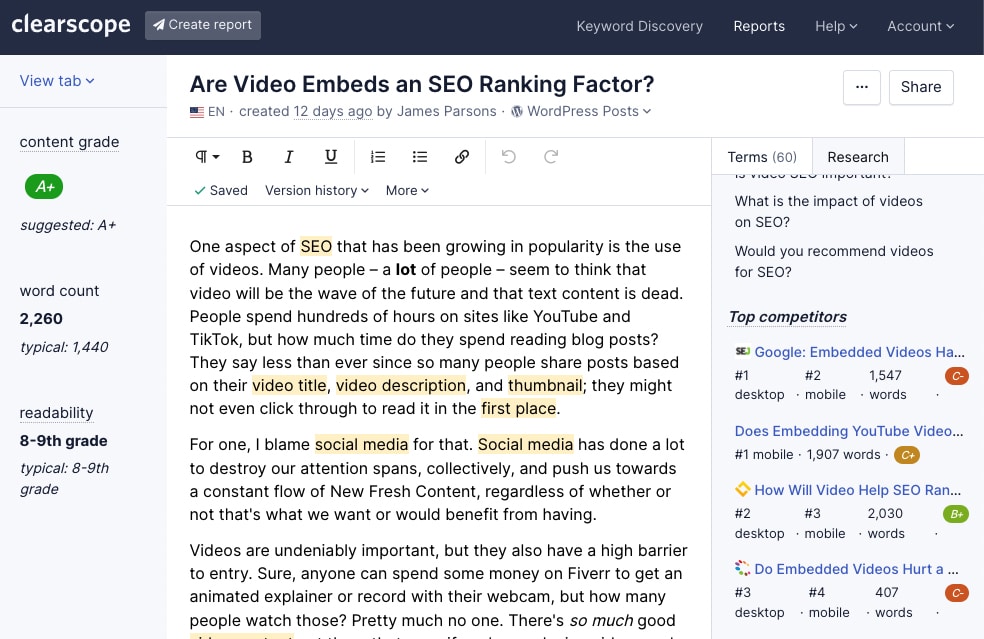
These tools walk a fine line. On the one hand, they work; the machine learning algorithms in these tools, analyzing large swaths of high-ranking content, can reverse-engineer relevant long-tail keywords and talking points that Google might identify as relevant and valuable. On the other hand, specifically optimizing for Google over users is a surefire way to, sooner or later, be penalized for doing so.
I even use content analysis tools like Clearscope occasionally and find it helpful. I'm very cautious in how I use it, and I don't blindly take every suggestion it makes; keyword stuffing is a great way to hurt your content quality.
Keyword Locations and Search Value
Let's get back to keywords and the technical side of how they work with Google.
When Google analyzes a piece of content, they break it down into parts: sections, paragraphs, sentences, and individual words. They take context, timing, similar pages, and thousands of other data points into account. They can explore how important a word is to a page by how common it is in that piece and compare that to how common it is across all content on the internet. That's what the TF*IDF algorithm does, though it's just a simplified and keyword-focused version to mimic how Google may look at keywords today.
Various other attributes of words and keywords are also important—for example, the position of a keyword on the page.
Keywords are given more weight when they're located in specific places. This fact is undeniable, and it's always a good idea to use your keywords in these places; if you wrote a great article, there's a good chance that this happened organically without methodical fine-tuning. What kinds of places?
- Your H1 heading (usually your page title).
- Your opening paragraph.
- Your H2 subheadings.
- Your conclusion.
- Your meta title tag.
- Your meta description.
Some other locations have been valuable in the past but are less useful now. One of the most prominent examples of this is the domain name. An exact match domain name used to be a massive boost to visibility, but successive algorithm updates removed that value, and now branding is usually better than a keyword domain.
Yes, and no.
Keywords describe what the page is about; they are essential. See, using keywords in prominent places is necessary for users too. A generic blog title without keywords doesn't tell a user what a post is about, so it hurts the user experience. Google would instead provide that better user experience than downgrade using keywords in titles. After all, if they did, every blog post would be titled "Untitled Post," and you'd have to roll the dice to find what you want. Don't get the wrong idea just yet, though.

The key is that using keywords in these locations informs users about what a post is about. Using your keywords in these specific, valuable locations is part of having a conversation about those topics.
Of course, there are limits. The more awkward or specific the keyword is, the harder it is to use in those locations naturally. Something like "keywords in the first paragraph" is easier to work into a page than "keyword optimization in Richmond, VA." Even still, that means you can't use the precise exact-match keyword quite as often. You can still use component keywords throughout the post. Google is smart, and they'll get the idea.
Where and How to Use Keywords Properly
Then, once you've finished writing an excellent post covering your subject, you can do a little optimization work. This stage might be where I use software like Clearscope; I take a complete, mostly-polished draft, run it through the tool, and let it recommend additional relevant keywords and additional locations for keywords. I see which keywords I talked about, which I may have missed, and which are nonsense.
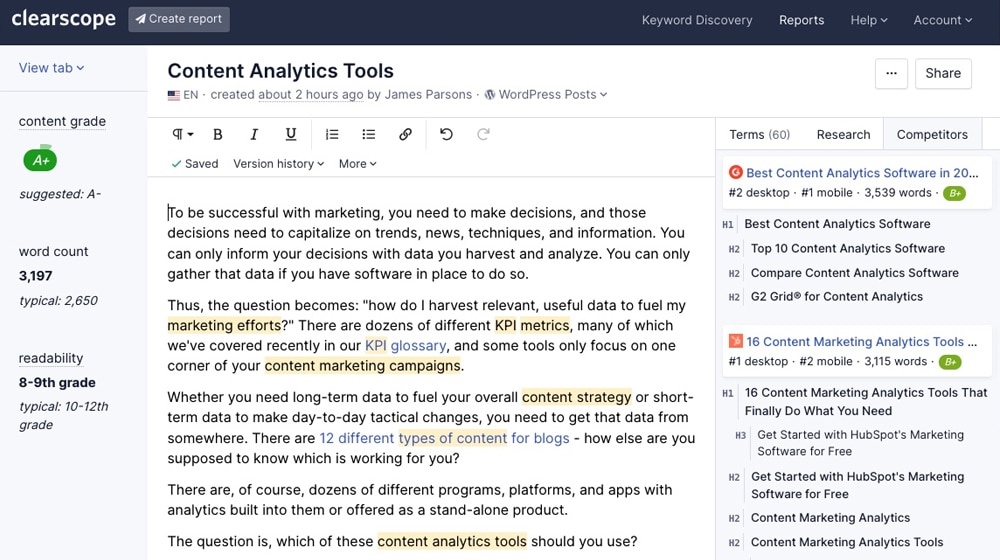
Do I take all of the suggestions? No. Does it help to take some of them? Yes. Tools like Clearscope, MarketMuse, or Surfer do two things for me.
- The first is it gives me ideas for where to use keywords a little more proactively. I'll be honest; when I get on a roll, I write, and I don't focus on the SEO aspects of my writing. I want to write something valuable and engaging, and I don't need to shoehorn "using keywords in your opening paragraph" awkwardly into random passages to do it. So, having a tool that can point out, "hey, you could work that in about here," is a practical option.
- Second, it gives me ideas for secondary keywords. A big part of keyword over-optimization is focusing on one narrow, exact keyword and not using alternatives, synonyms, or natural variations. I see it a lot, and I'm always surprised that people contort themselves into knots, trying to include their main keyword without mentioning alternatives.
What are you going to do, create another piece of content with an alternative SEO keyword, but cover the same topic in the same way? That might also look a little spammy; you don't want duplication or cannibalization issues.
You'll be fine if you're writing in a way that provides value to your audience. Sometimes you may miss, and that's okay. Sometimes, it's more about the words you don't say than choosing the right keywords.
My opinion?
- Your first paragraph is essential, and forcefully inserting a keyword into it can put your article off to a terrible start and potentially hurt your performance. It may happen naturally, and if it's a good fit for that section, that's fine! It would be best if you didn't focus on this.
- If you write a 1,500-3,000 word article, Google is smart enough to determine its quality and subject matter. It also understands synonyms and tangential keywords and learns from your internal and external links on that page (and their anchor text). If you didn't happen to use your exact match keyword in your first paragraph, it's okay. They have hundreds of ways to determine relevance, and an exact match keyword in your first paragraph is not one of them.
Trust me; Google doesn't need a keyword in your first paragraph to help them understand your content better - give them some credit!





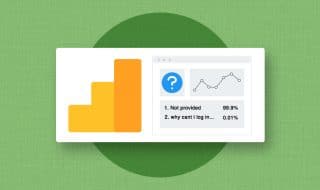


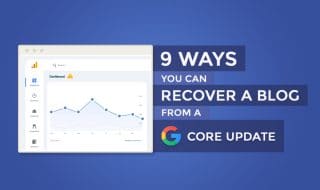

Comments